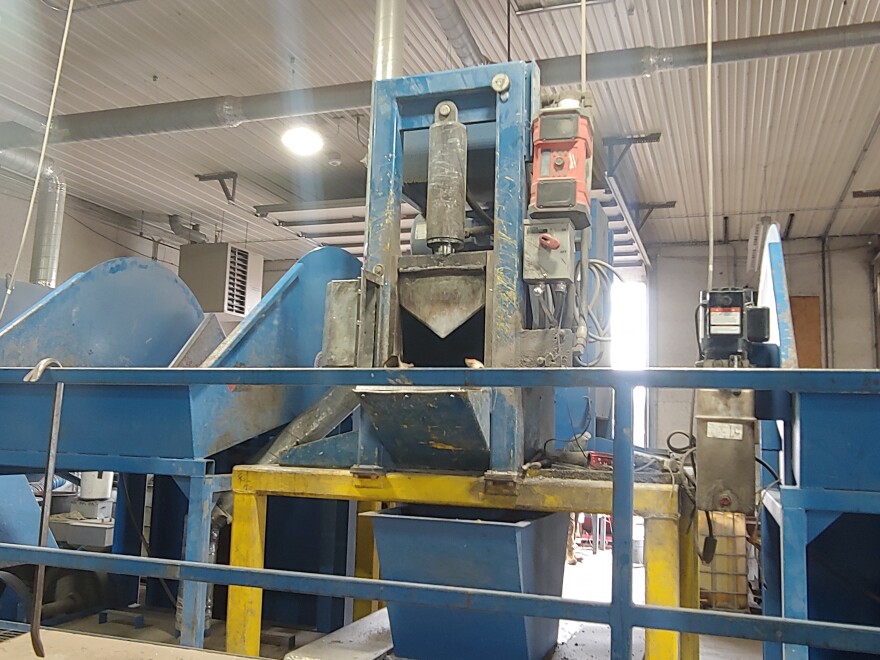A huge increase in thefts of catalytic converters has hit Milwaukee and the nation. Thieves are sliding under cars and trucks and brazenly sawing off converters by the thousands. The attraction is the valuable metals inside the converter, an anti-pollution device.
Imagine stepping outside your home and making a troubling discovery about a family car. That's what happened on a recent day to Milwaukee resident Ben Wilson.
"I woke up in the morning and was moving my wife's Honda Element out of the driveway. And when I turned it on, it made an incredibly loud sound," he says.
That's because there was about an 18-inch hole between the engine and muffler where the cylinder-shaped catalytic converter used to be. In what likely took about two minutes, someone had slid under the Honda and sawed off the device. Wilson says he feels lucky that he has insurance that covered about 90% of the $2,000 replacement cost.
Insurance pay-outs are stacking up, but many other theft victims don't have coverage.
An Illinois-based group, National Insurance Crime Bureau (NICB), is tracking the surge in catalytic converter thefts. The bureau says there's been about a ten-fold increase in thefts since 2018, with more than 14,000 reported being swiped in 2020.
The organization blames the under-vehicle crime wave on much higher prices for the valuable metals inside catalytic converters. One metal, rhodium, has skyrocketed to about $28,000 an ounce, though only a tiny fraction of that quantity — perhaps worth a few hundred dollars — goes inside each converter.
NICB executive David Glawe says the COVID-19 pandemic has cut production of the metals at overseas mines.
"The laborers in the mine have been reduced and the supply chain has been disrupted, which has drastically increased the cost of these precious metals to be mined and produced," he says.

The increase in converter crime has led to repair shops to improvise anti-theft measures.
At The Family Mechanic in Milwaukee, Zeb Corona is welding two reinforced iron bars, or rebar, around the catalytic converter of a 2008 Toyota Prius. Zeb's brother, Elijah Corona, runs the shop.
Elijah Corona says to test his product, he's tried to cut through a standard half-inch thick, stick of rebar. "Using one of the best saws on the market and some of the best Sawzall blades on the market, it literally took me minutes to chop through half of a stick and it ruined multiple blades," he says.
Elijah Corona says he charges about $75 for the rebar welding. He says that's maybe half or a third the installed price of converter shields or cages some parts companies now offer.
He says he'd rather focus on more standard repair shop duties like fixing engines, and see the converter thefts go away. So, he's urging scrap metal buyers to demand more identification from would-be sellers, and reduce what some have called the black market for stolen converters.
At converter processor AB CatTech in Burlington, Wisconsin, the owner says safeguards are already in place.

At the business, workers operating two guillotine-like shearing machines cut open a few of the 2,000 catalytic converters that come in each day from legitimate suppliers in Wisconsin and the firm's other sites in Georgia, Florida and Arizona.
Other parts of the machine break down the precious metals into, what the company calls, almost baby powder form to see if it's profitable to ship the contents to a specialty metals refinery. Websites indicate recyclers pay $50 to $200 to legally obtain a failed converter, or one from a junked vehicle. But industry sources say with the high metals prices, it's possible for processors to make several hundred dollars per unit selling contents to the refinery.

AB CatTech's Brad Regner says if you come in to his facility with catalytic converters, be prepared for questions.
"I'm going to ask you for your drivers license. I'm going to ask you what your business is and, if you can't verify those two right off the bat, then I'm not going to do business with you. We won't even welcome you in," he says.
All states already have laws addressing scrap metal thefts, but Regner says he welcomes more regulation.
According to a national trade group, Institute of Scrap Recycling Industries (ISRI), nearly two dozen states have passed or are considering legislation to shrink the avalanche in catalytic converter thefts.
The institute says it wants loopholes closed that allow some converter buyers to claim they are not scrap dealers and skip the record-keeping requirements.
Meanwhile in Milwaukee, theft victim Ben Wilson says with a new catalytic converter now installed, he's taking his wife's car over to The Family Mechanic for the rebar treatment.






